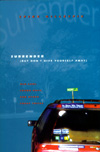
Comment
on this story
|
 |

Writers with local ties explore fun, fantasy
by Julia Watts
The first time I saw Spike Gillespie, she was reading her poetry at Open Mic Night at the Vatican Pizza in Fort Sanders. Her hair buzzed into the flat-top that provided her nickname, her bare bicep sporting a tattoo of a cow with the caption "Born to Graze," Gillespie poured out words that were hilarious one moment and heartbreaking the next. To my naive college-freshman eyes, she was the epitome of bohemian cool.
My freshman days are long gone, and so is the Vatican Pizza. And Spike Gillespie is no longer in Knoxville, but she is still the cool bohemian purveyor of hilarious and heartbreaking words, as she demonstrates in her collection of essays, Surrender (But Don't Give Yourself Away) (University of Texas Press, $24.95).
The cover of Surrender depicts Gillespie's rattletrap car, decorated with stickers singing the praises of animal rescue and breast milk (One of her stickers, which did not sing the praises of George W. Bush, was digitally removed from the cover in a cowardly move by the publisher). The car has stopped in front of a street sign reading "Hope." And despite the many serious topics tackled within the book's pages, Surrender does seem to find Gillespie moving toward a more hopeful state than did her previous book, All the Wrong Men and One Perfect Boy.

While Surrender, a compilation of the columns that have given Gillespie a devoted cult audience, covers some of the same emotional territory as her previous book (Gillespie's struggles with alcoholism and depression, her dysfunctional relationships with her father and assorted men, and her love for her son Henry). But it also branches out into a variety of new topics, from her reaction as a mother to 9/11 to the emotionally healing powers of Neil Diamond.
She writes about Knoxville, too. In the essay, "Knoxville, Tennessee," she tells the story of her and Henry's relocation to Knoxville to escape Gillespie's stalking ex-husband. With loving detail, Gillespie describes how visiting old friends, spending cozy nights at the Hotel Saint Oliver, and eating at Harold's Deli and the Tomato Head helped her feel safe again. She writes, "I knew it was right to come back here. Knew that the voice in my head telling me to run to Knoxville was speaking a truth."
In All the Wrong Men..., Gillespie displayed her emotional wounds so repeatedly that I sometimes felt the need to look away. But in Surrender she seems to be working on healing some of those wounds. As the car on the book's jacket indicates, Gillespie (and her fellow travelers) negotiate a difficult road, but hope is in sight.
Another Knoxville homegirl, JaNell Golden, has a poem included in the new anthology, Julia, Daughter of... (Cyber-Pulp Houston, available at www.cyberpulp.netfirms.com for $3). The poems in the collection fall under the heading of speculative poetry, dealing with many of the same themes as science fiction and fantasy fiction. Each poem focuses on a different character named Julia, and most poems begin with the phrase "Julia, Daughter of..." I have to admit it did get a little bit creepy reading my name over and over again, especially in the poems in which Julia was a succubus, zombie, or murder victim.
As is often the case in anthologies, some pieces in the collection are better than others, but in all the poems it's interesting to see what radically different Julias the authors create. The Julia in Golden's poem "Goodwife" is a Puritan girl accused of witchcraft. The poem's speaker is Julia's father who is explaining his acceptance of the town elders' decision to stone his daughter ("And I would have this done quickly/Lest the town think me ungodly"). It is a chilling and emotionally complex poem, one of the best in the collection.
Julia, Daughter of... is a good example of the kind of writing that seems to have found a home in the world of electronic publishing—creative work from diverse voices that might be too edgy to be accepted by mainstream commercial publishers.

November 27, 2003 * Vol. 13, No. 48
© 2003 Metro Pulse
|